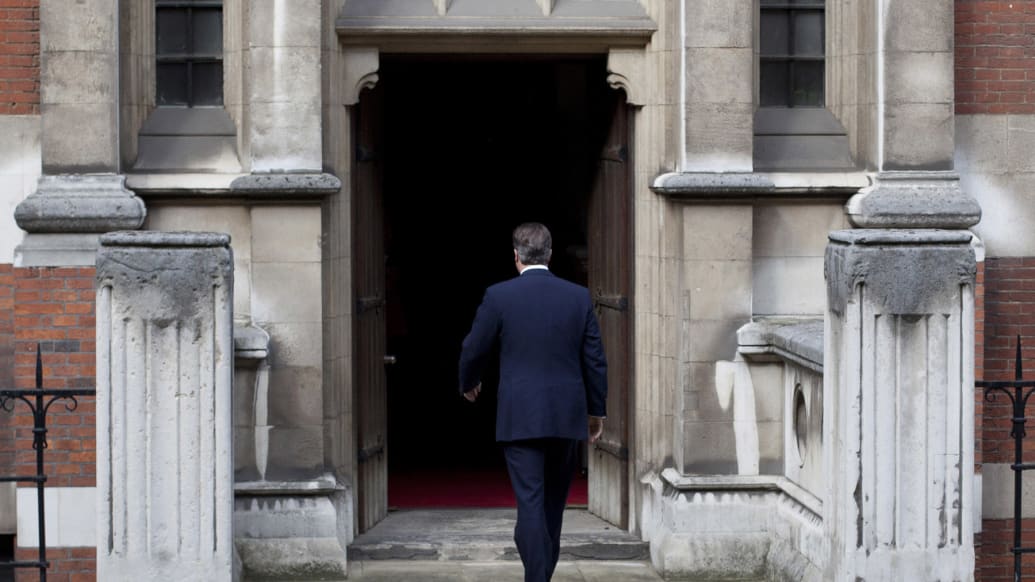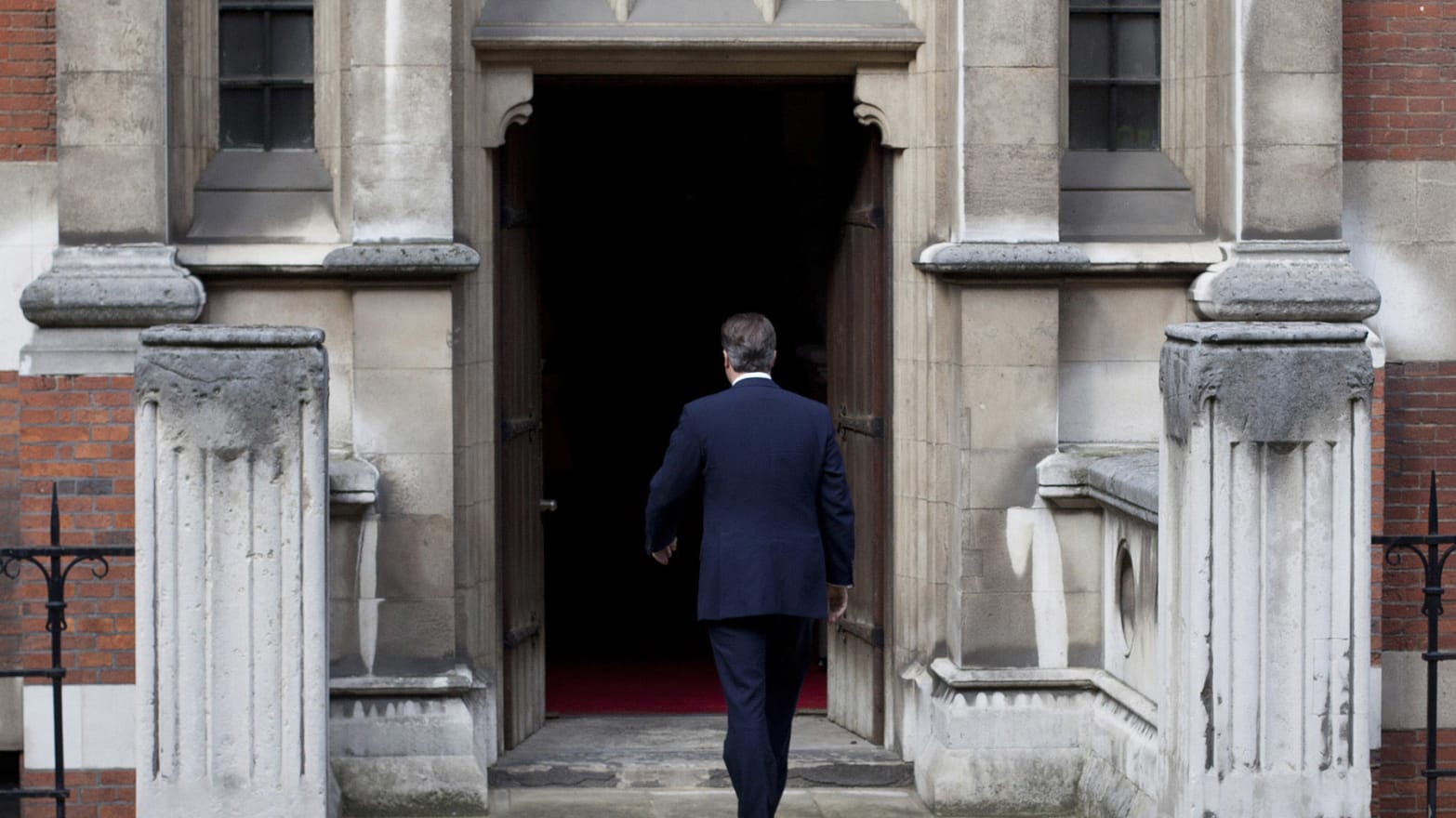In his long-awaited appearance before the Leveson Inquiry this morning in London, British Prime Minister David Cameron admitted that politicians had gotten too close to the press. That point was made uncomfortably clear in a text message he received from Rebekah Brooks when she was editor of Rupert Murdoch’s Sun, which was revealed during his testimony today. Sent in October 2009, just after the Sun had switched its support to Cameron’s Conservative Party, Brooks wrote: "Rooting for you tomorrow not just as a proud friend but because professionally we're in this together".

That line is already leading the news and—unless something more damning emerges—will dominate the headlines. It will undo all Cameron's emphatic assurances there was no “grand bargain” between the Murdoch empire and the Conservatives in the run-up to the last election. Together with the revelation of 1,400 meetings with the press while he was in oppositions—one per day—that only halved once Cameron was in office, the perception that the current prime minister has been obsessed with courting the media may be hard to dispel.
Cameron is a polished performer, but his appearance at the inquiry this morning was edgier than usual, his hands clasped before him on the desk as Robert Jay, the counsel to the inquiry, took him through an opening discussion about his attitude toward the media. Cameron has a background as a public affairs executive for one of Britain's largest commercial TV broadcasters, Carlton Communications, and he emphasized the primary importance of television over the printed press in political communications. In retrospect, this was not such a smart move.
Before the line of questioning had even arrived at this point, Cameron was refuting the allegation, made by former prime minister Gordon Brown, that there had been a quid pro quo of support for James Murdoch's commercial interests in News International’s controversial bid for the British broadcaster BSkyB in return for the media empire’s switch from supporting Brown’s Labour government to Cameron’s Tories. But Jay honed in on a series of meetings in the summer of 2009, when the Sun switched to supporting Cameron's bid to be next prime minister and Conservative policy towards the BBC and broadcasting regulation seemed to chime more with the demands famously made by Murdoch in a MacTaggart lecture in 2009. Cameron made a vigorous defense of his own independent policy-making—and angrily insisted he hadn't done any kind of deal. When Jay suggested there could be a “perception” of such a concordat, Cameron pushed back, saying that vague perceptions of “winks and nods” could easily decline into a "trial for witchcraft."
As so often in the past, however, it's not the much-rehearsed verbal performance that will dominate the headlines, but the unexpected written evidence that emerges through the Leveson Inquiry's Section 21 powers to subpoena materials. Today, the surprise source was News International, which holds a back-up of the texts sent by Brooks, its former CEO. The “in this together” text was sent by Brooks to Cameron just before he was to give a speech at the Conservative party conference. “I am so rooting for you tomorrow not just as a proud friend but because professionally we're definitely in this together!” Brooks wrote. Then she signed off, “Speech of your life? Yes he Cam!”
Cameron responded that the text indicated that, while he and Brooks were indeed “friends,” he and the Sun were “pushing the same agenda.”
When Cameron set up the Leveson Inquiry last summer, he probably had little idea that it would end up as an investigation into his own background, his own friendships, text messages, horse-riding activities, and would threaten the stability of his coalition government.
The scandal surrounding the hacking of the phone of murdered teenager Milly Dowler and the shuttering of Britain’s oldest and bestselling tabloid, News of the World, has developed over the last six months of the Leveson Inquiry into a wider scandal about the governance of Britain and the sense of small, cozy circle of wealthy people controlling both the media and Westminster, with the prime minister as the focus.
Act I of the judge-led inquiry was dominated by the victims of privacy intrusion, not only the parents of Dowler, but also the parents of the missing child Madeleine McCann, accused by the papers of being murderers; or of actress Sienna Miller, hounded down the street by a dozen large men who happened to be paparazzi; or the singer Charlotte Church, whose mother’s attempted suicide, provoked by a tabloid exposure of her husband’s infidelity, was also parlayed into a front-page exclusive by Fleet Street.
But this turned out to be only a scene setter.
Act II concentrated on the cozy relationship between the press and the British police, particularly Rupert Murdoch’s News International, whose senior executives were shown to be wining and dining senior Metropolitan police officers at expensive clubs and restaurants while the news organization was supposed to be under investigation for phone hacking. In February, Deputy Assistant Commissioner Sue Akers, now in charge of one of the largest police investigations in recent years, revealed there was much more to the relationship than that. She alleged that there was a “pattern of corrupt payments” from the News of the World’s sister paper The Sun, to a “network of public officials.” Suddenly, the allegations went from phone hacking to corruption.
Even that was only prelude to what was to come.
The third module of the Leveson Inquiry, dedicated to the relationship between the press and politicians, has been the most dramatic yet. Not only does it have some big-hitting players—from James and Rupert Murdoch to Tony Blair and Gordon Brown—it has already uncovered a bigger issue beyond phone hacking or police corruption. The prime suspect has become News Corp.’s proposed $16 billion takeover of the major pay-TV channel BSkyB, long planned by James Murdoch as a bid for dynastic succession and pursued relentlessly immediately after Cameron entered Downing Street as the head of the coalition government in the early summer of 2010.
All the dramatic strands now converge on Cameron. He employed the former News of the World editor Andy Coulson, recently charged with perjury, as head of communications for the Conservative Party in 2007, and then brought him in as chief spokesman for the whole government in 2010. Cameron also was close friends for many years with former News International CEO Rebekah Brooks, charged with three counts of perverting the course of justice, and allegedly went riding on Raisa, a retired police horse, loaned to Brooks by her friends at the Met, and signed off texts messages to her with LOL, thinking this meant “lots of love.”
Coulson had resigned from the newspaper in 2007, after one of its reporters was convicted of hacking the phones of members of the royal household. Coulson has always insisted that he wasn’t aware of phone hacking at the newspaper. On the stand today, Cameron said he had not independently confirmed Coulson’s assurances. "If someone had given me evidence that he knew about phone hacking I wouldn't have employed him and I would have fired him," Cameron said.
Even more important in this third module, which increasingly has focused on the BSkyB takeover, is Cameron’s appointment of Culture Secretary Jeremy Hunt, a known “cheerleader” for Rupert Murdoch, to oversee the bid in a “quasi-judicial” capacity, after having just sacked Business Minister Vince Cable for being too “partial” against it. As the forced disclosure of hundreds of meetings, emails, and texts have made clear, senior Conservative politicians and advisers were in contact almost daily with senior News Corp. executives during the adjudication of Britain’s biggest media merger. One former senior News International employee told The Daily Beast that at that time “the Court of Cameron and the Court of Murdoch became almost totally enmeshed.” This has caused one of the biggest rifts in the coalition government since its formation, with the Liberal Democrats abstaining in a Labour forced vote Wednesday afternoon criticizing Hunt for breaking the ministerial code.
Nothing today has changed this. Cameron gave the predicted polished and plausible performance, and answered all the questions—at least those he can remember—for there was an above average number of "I cannot recall" memory lapses in his testimony. His decision to appoint Jeremy Hunt to oversee the BSkyB bid has been firmly placed on the shoulders of a civil servant and the government's legal advisers. True, the Brooks text has produced another round of headlines and embarrassment, but it is nothing astonishingly new. The drama has already happened.
The inquiry, which was designed to explore the invasion of privacy by the press, has now shone a light into the otherwise secret backdoor channels of a powerful media corporation and three generations of politicians willing to do deals in return for favorable coverage. We have, on oath, Rupert Murdoch saying he never asked for anything, and three former prime ministers and the current deputy prime minister saying he did. David Cameron may be taking the stand, but he just happens to be prime minister when the music stopped.
This fall, Lord Justice Leveson will make recommendations about how to prevent press abuses in the future, but the opposition leader Ed Miliband has already preempted this by arguing that plurality and cross-ownership rules should restrict any proprietor assuming the dominance in the broadcasting and press achieved by News Corp. Meanwhile, Brooks appeared at Westminster Magistrate’s court Wednesday, to have her trial date set for June 22.
After Dowler’s phone was hacked in 2002, the British media failed to report the phone-hacking scandal for nearly a decade: the only thing that eventually uncovered that scandal was the legal process of other phone-hacking claimants. After 30 years of a political class cowed and awed by the media in general, and its most powerful player in particular, only the legal process of the Leveson Inquiry has exposed the evidence to the light of public scrutiny.
For that reason alone, it will become a historic drama in British public life, whatever happens next. With four more arrests this morning, including a journalist from The Sun, for alleged corrupt payments to police, the legal narrative now shifts away from the niceties of the Royal Courts of Justice and a public inquiry, to a series of criminal trials that threaten to stretch until 2015, the time of the next election.
David Cameron must be ruing the day he became best friends with Rebekah Brooks and appointed Andy Coulson as his communications supremo, but he will have plenty more days to regret that yet.

